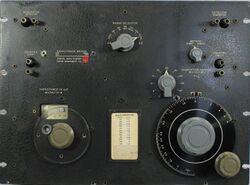716-C: Difference between revisions
No edit summary |
|||
| Line 11: | Line 11: | ||
|manuals= | |manuals= | ||
* [[Media:GR 716C Capacitance Bridge 681-K 11-1959.pdf|General Radio 716-C Capacitance Bridge Manual 681-K 1959]] | * [[Media:GR 716C Capacitance Bridge 681-K 11-1959.pdf|General Radio 716-C Capacitance Bridge Manual 681-K 1959]] | ||
{{Catalog History}} | |||
}} | }} | ||
The {{Title|General Radio 716-C Capacitance Bridge}} was introduced in {{Catalog L}} and remained available through {{Catalog U}}. | The {{Title|General Radio 716-C Capacitance Bridge}} was introduced in {{Catalog L}} and remained available through {{Catalog U}}. | ||
Revision as of 19:56, 7 May 2024
The General Radio 716-C Capacitance Bridge was introduced in Catalog L (1948) and remained available through Catalog U (1970).
The Type 716-C capacitance bridge uses the Schering circuit and is direct reading at five frequencies, 100 Hz, 1 kHz, 10 kHz, and 100 kHz. Dissipation factor is direct reading at 1 kHz but the usable range is greater, see the manual. Capacitance measurements can be made by the direct or substitution methods. When using the substitution method a balancing capacitor is required that is 100 pF greater than the unknown, the Types 505 and 509 are recommended. Inductance and Q of large inductors can be measured by the substitution method. The 716-C requires a generator and detector, the Types 1310-A or 1311-A oscillators and 1232-A null detector are recommended.
Specifications
- Capacitance Range: Direct method, 100 to 1150 pF; Substitution method 0.1 to 1050 pF
- Accuracy: ±0.1%
- Dissipation Factor Range: 0.00002 to 0.56
- Accuracy: ±2%
- Frequency: 30 Hz to 300 kHz; useful up to 1 MHz with corrections
Links
- Experimenter describing Type 716-A December 1936
- Experimenter describing Type 716-B April 1942
- Experimenter describing Type 716-C April 1947














